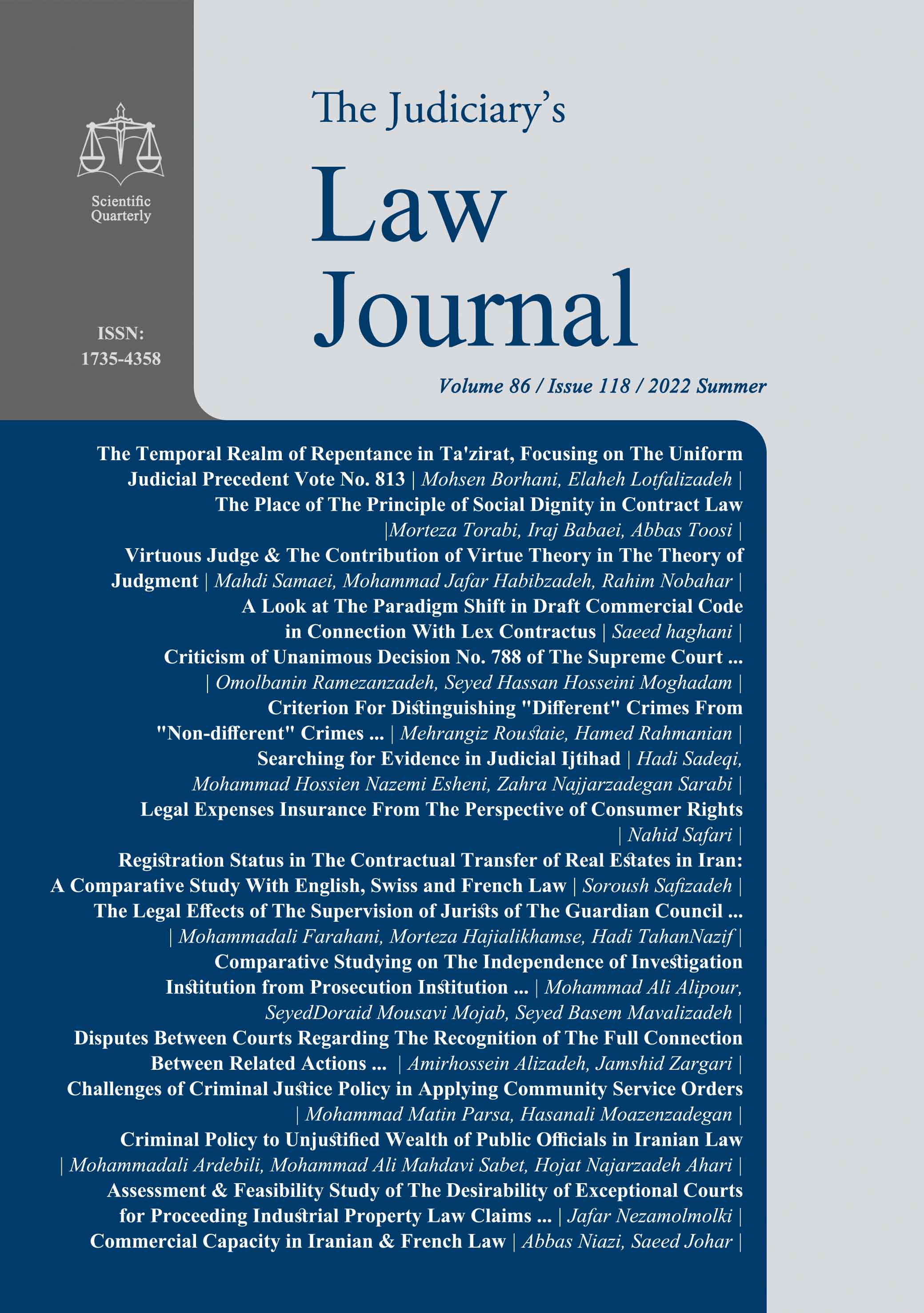Document Type : Research/Original/Regular Article
Authors
1 PhD Student in Public Law, Faculty of Islamic Studies and Law, Imam Sadegh (AS) University, Tehran, Iran
2 PhD in Public Law, Faculty of Law and Political Science, University of Tehran, Tehran, Iran
3 Assistant Professor, Department of Public Law, Faculty of Islamic Studies and Law, Imam Sadegh (AS) University, Tehran, Iran
Abstract
Applying the “rule of sharia” over laws and regulations is one of the most important issues of the Islamic Republic of Iran legal system. The implementation of this rule, which is mainly addressed in Article 4 of the law, has created variable legal and judicial effects on the legal system. In other words, announcing the inconsistency or non-inconsistency of the approvals or laws and regulations that have been absorbed by the jurists of the Guardian Council in various forms on the legal and judicial system.
Therefore, the manner of announcing the opinion of respected jurists is important. This has created the ground for the realization of Article 4 of the Constitution and the Islamism of laws and regulations in the legal system, or on the other hand, has created the legal system with ambiguity, conflict, and legal creation. Therefore, in this article entitled "Legal effects of the supervision of the jurists of the Guardian Council by announcing and general laws and regulations in the judiciary of Iran" an attempt has been made to make extraordinary works that have emerged as a result of the comprehensive or complete announcement of the jurists of the Guardian Council That is analyzed.Therefore, first, with a descriptive method, the types of objections raised by the jurists of the Guardian Council have been counted, and as an example, the objection of "application or general laws and regulations" has been mentioned, and finally, with an analytical method of works It can be examined and summarized to show its impact on the country's judicial system, in such a way that in order to achieve the purpose of Article 4, the opinions of the jurists of the Guardian Council in the cases subject to this article must be documented and reasoned, and concise opinions must be avoided.
Keywords
- Articles 4 of the Constitution
- the Guardian Council
- Sharia Contradiction
- the Judicial system
- Islamic principals
Main Subjects
- جمعی از پژوهشگران (1396)، گزارش سلسله جلسات بازخوانی مشروح مذاکرات مجلس بررسی نهایی قانون اساسی سال 1358 (اصول 1 تا 20 قانون اساسی)، ج 1، تهران: پژوهشکده شورای نگهبان.
- حسنزاده، مهدی (1398)، «تحلیل قلمرو «جهت مخالفت با موازین شرعی» در نقض آرای محاکم»، مجله حقوقی دادگستری، دوره 85، شماره 113.
- حسینی بهشتی، سیدمحمد (1380)، جاودانه تاریخ: آشنایی با افکار و اندیشههای شهید مظلوم آیت الله بهشتی، تهران: انتشارات روزنامه جمهوری اسلامی.
- خسروی، احمد و حامد نوروزی (1399)، «حق بر فهم قانون»، مجله حقوقی دادگستری، دوره 84، شماره 111.
- خمینی موسوی، سیدروح الله (1390ق)، تحریر الوسیلة، ج 2، قم: مؤسسه مطبوعاتی اسماعیلیان.
- صدر، سیدمحمدباقر (1387)، قواعد کلی استنباط، چ پنجم، با ترجمه رضا اسلامی، ج 1. قم: بوستان کتاب
- فتحی، محمد و کاظم کوهی اصفهانی (1397)، نظرات شرعی فقهای شورای نگهبان بر اساس اصل 4 قانون اساسی جمهوری اسلامی ایران، تهران: پژوهشکده شورای نگهبان
- قافی، حسین و سعید شریعتی فرانی (1392)، اصول فقه کاربردی: مباحث الفاظ، چ نهم، ج 1، قم: پژوهشگاه حوزه و دانشگاه.
- قطبی، میلاد (1396)، جایگاه و صلاحیتهای دیوان عدالت اداری در نظام حقوقی جمهوری اسلامی ایران با نگاهی به نظرات شورای نگهبان، چ دوم، تهران: پژوهشکده شورای نگهبان.
- محقق داماد، سیدمصطفی (1385)، مباحثی از اصول فقه، ج 1، تهران: مرکز نشر علوم اسلامی.
- محمدی، ابوالحسن (1393)، مبانی استنباط حقوق اسلامی با اصول فقه، چ پنجاه و چهارم، تهران: دانشگاه تهران.
- مشکینی، علی (1394)، اصلاحات علم اصول، قم: بوستان کتاب.
- مظفر، محمدرضا (1385)، ترجمه اصول فقه، چ پنجم، با ترجمه محسن غرویان، ج 1، قم: دارالفکر.
- الهام، غلامحسین و زهروی رضا (1396)، «بررسی تطبیقی چالشهای ناشی از سکوت قانون در حقوق کیفری ایران و فقه امامیه»، مجله حقوق تطبیقی دانشگاه تهران، دوره 8، شماره 2.
- یزدی، محمد (1375)، قانون اساسی برای همه، چ اول، تهران: امیرکبیر.

